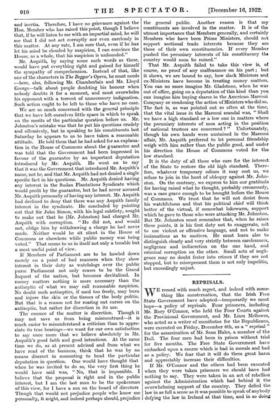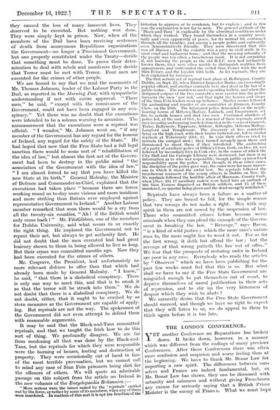REPRISALS.
WE record with much regret, and indeed with some- thing like consternation, that the Irish Free State Government have adopted—temporarily we must hope—a policy of reprisals. Four prisoners, including Mr. Rory O'Connor, who held the Four Courts against the Provisional Government, and Mr. Liam Mellowes, who acted as a writer of manifestos for the Republicans, were executed on Friday, December 8th, as a " reprisal " for the assassination of Mi. Sean Hales, a member of the Dail. The four men had been in prison without trial for five months. The Free State Government have embarked upon a course which is bad in morals and bad as a policy. We fear that it will do them great harm and appreciably increase their difficulties.
If Mr. O'Connor and the others had been executed when they were taken prisoners we should have had nothing to say. They, were taken in an act of rebellion against the Administration which had behind it the overwhelming support of the • country. They defied the law in as full a sense as it was possible to speak of anybody defying the law in Ireland at that time, and in so doing they caused the loss of many innocent lives. They deserved to be executed. But nothing was done. They were simply kept in prison. Now, when all the members of the Dail have been receiving sentences of death from anonymous Republican organizations the Government—no longer a Provisional Government, but one properly constituted under the Treaty—decide that something must be done. To prove their deter- mination to deal with rebels and murderers they decide that Terror must be met with Terror. Four men are executed for the crimes of other people.
We are bound to say that we read the comments of Mr. Thomas Johnson, leader of the Labour Party in the Dail, as reported in the Morning Post, with sympathetic understanding if not with entire approval. "These men," he said, "except with the connivance of the Government, could not have been engaged in any con- spiracy." Yet there was no doubt that the executions were intended to be a solemn warning to assassins. The announcement that the executions were a reprisal was official. "I wonder," Mr. Johnson went on, "if any member of the Government has any regard for the honour of Ireland, any regard for the safety of the State." Ile had hoped that now that the Free State had a full legal sanction there would be some sort of "rehabilitation of the idea of law," but almost the first act of the Govern- ment had been to destroy in the public mind "the association of the Government with the idea of law." "I am almost forced to say that you have killed the new State at its birth." General Mulcahy, the Minister of Defence and Commander-in-Chief, explained that the executions had taken place "because there are forces working round us to-day more vicious and more insidious and more striking than Britain ever employed against representative Government in Ireland." Another Labour member remarked that soon there would be a cry from all the twenty-six counties, " Ah ! if the British would only come back 1" Mr. FitzGibbon, one of the members for Dublin University, said what seems to us exactly the right thing. He implored the Government not to repeat their act, but always to get authority first. He did not doubt that the men executed had had great leniency shown to them in being allowed to live so long. But their crime was committed months ago. Now they had been executed for the crimes of others.
Mr. Cosgrave, the President, had unfortunately no more relevant defence to offer than that which had already been made by General Mulcahy. "I know," he said, "that there is a diabolical conspiracy. There is only one way to meet this, and that is to crush it so that the terror will be - struck into them." We do not doubt that there is a diabolical conspiracy. We do not doubt, either, that it ought to be crushed by as stern measures as the Government are capable of apply- ing. But reprisals are not the way. The spokesmen of the Government did not even attempt to defend them with reasonable arguments. It may be said that the Black-and-Tans committed reprisals, and that we taught the Irish how to do this sort of thing.. We profoundly disagree. We are far from condoning all that was done by the Black-and- Tans, but -the reprisals for which they were responsible were the burning of houses, looting and destruction of property. They were occasionally out of hand in face of the most terrible provocation, but we cannot call to mind any case of Sinn Fein prisoners being shot for -the offences of others. We will quote an admirable .passage on this subject from the article on Ireland in .the new volumes of the Encyclopaedia Britannica :— "More serious were the issues raised by the ' reprisals ' carried outty the force, or rather by some of its members, when any of them iwere murdered. in matters of this sort it-is not the function of the historian to approve or to condemn, but to explain ; and in this case the explanation is not far to seek. The general attitude of the
` Black-and-Tans' is explicable by the abnormal conditions under which they worked. They found themselves in a country nomi- nally and even apparently at peace, for its normal life continued through all the troubles, and among a people polite and outwardly even demonstratively friendly. They soon discovered that this was all illusion ; that the country was a prey to civil strife in its most cruel and barbarous form ; and that the seeming urbanity of the people was too often a treacherous mask. It is not surprising if, not knowing the people as the old R.I.C. men had intimately known them, they were often unable to distinguish realities from appearances, and confounded the veiled Sinn Feiner with the real Sinn Feiner, and the loyalist with both. As for reprisals, they are best explained by instances.
The first serious act of reprisal took place at Balbriggan, County Dublin, on Sept. 21, when District-Inspector Burke, an exceedingly popular officer, and another constable were shot dead in the bar of a public-house. The murderers used expanding bullets, and when the disfigured corpses of the two constables were carried into the police barracks the men 'saw red,' and that night the houses and shops of the Sinn Fein leaders went up in flames. Similar scenes followed the ambushing and murder of six constables at Women, County Clare, on the 20th. The infuriated police descended on the neigh- bouring towns of Miltown-Malbay, Lahinch, and Ennistymon, set Are to certain houses and shot two men. Continued murders of police led, at the end of Oct.,to a renewal of these reprisals, armed men invading and causing much destruction in the towns of Granard, Tralce, Ballymote, Tipperary, Athlone, Killorglin, Miltown-Malbay, Longford and Templemore. The discovery of live constables lying on the high road, with their brains battered out, led to similar reprisals at Tubercurry (Oct. 2). In vain their officers tried to restrain the enraged men ; they turned savagely upon them and threatened to shoot them if they interfered. The ambushing of a party of auxiliary police at Dillon's Cross, Cork, on Dec. 18, was followed by incendiary fires in Cork city, in the course of which the City Hall and the Carnegie Library were destroyed, but there is no information as to who was responsible, though public opinion fixed responsibility upon the police. But though, in these other cases, the discipline of the police gave way, the cases were far more numer- ous in which it stood the awful test. No reprisals followed the treacherous massacre of the young officers in Dublin on Nov. 21. No reprisals followed the horrible affair of Macroom, County Cork, when (Nov. 29) 17 auxiliary cadets were lured into an ambush of 100 Sinn Feiners disguised as British soldiers, and 15 of them murdered, no quarter being given and the dead savagely mutilated."
Reprisals have always been a failure as a matter of policy. They are bound to fail, for the simple reason that two wrongs do not make a right. Men with any spirit -in them are not cowed by the suspension of law. Those who committed crimes before become worse criminals when they can plead the example of the Govern- ment in breaking the law. "Revenge," says Bacon, "is a kind of wild justice ; which the more man's nature runs to, the more ought law to weed it out. For as for the first wrong, it doth but offend the law ; but the revenge of that wrong putteth the law out of office." We fear that the prospects of restoring order in Ireland are poor in any case. Everybody who reads the articles by " Observer " which we have been publishing for the past few weeks must feel that this is so. But what shall we have to say if the Free State Government are misguided enough to put themselves out of court, to deprive themselves of moral justification in their acts of repression, and to stir up the very bitterness of despair which they wish to abate ? We earnestly desire that the Free State Government should succeed, and though we have no right to expect that they will listen to us, we do appeal to them to think again before it is too late.















































 Previous page
Previous page